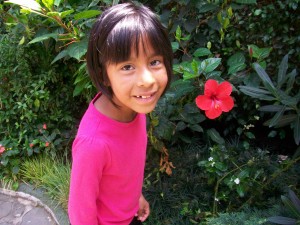 I belong to several online adoption groups, and one of the topics most often discussed is contact with birth families. The collective wisdom among list members—at least those who post—is that contact with birth families is good, and the sooner contact is made, the better. This isn’t always possible. In Guatemala, for example, if a child was abandoned at an orphanage, information to identify and thus find a birth mother isn’t available. If a child was relinquished by his or her birth mother to an attorney, however, identifying information is available. With some effort, adoptive parents can access this information and conduct a “search” for their children’s birth mother, usually with the assistance of someone in-country. (Please note: Adoptions from Guatemala closed two years ago; these examples illustrate the system previously in place.)
I belong to several online adoption groups, and one of the topics most often discussed is contact with birth families. The collective wisdom among list members—at least those who post—is that contact with birth families is good, and the sooner contact is made, the better. This isn’t always possible. In Guatemala, for example, if a child was abandoned at an orphanage, information to identify and thus find a birth mother isn’t available. If a child was relinquished by his or her birth mother to an attorney, however, identifying information is available. With some effort, adoptive parents can access this information and conduct a “search” for their children’s birth mother, usually with the assistance of someone in-country. (Please note: Adoptions from Guatemala closed two years ago; these examples illustrate the system previously in place.)
Books have been written by people who have been adopted and gone on a quest to search for their biological roots. Some I have read are Lucky Girl: A Memoir by Mei-Ling Hopgood; The Mistress’s Daughter by A.M. Homes; Wuhu Diary: On Taking My Adopted Daughter Back to Her Hometown in China by Emily Prager; and China Ghosts: My Daughter’s Journey to America, My Passage to Fatherhood by Jeff Gammage. The first two are written by adoptees who make contact with their biological families; the third and fourth are written by adoptive parents with children from China who return there to discover what they can about their children’s heritage.
After reading each of these books, I felt renewed responsibility to my children to discover as much information about their birth families as I could. Not to do so would be to deprive them of a crucial part of their identity. I didn’t have that right.
But this past weekend I met a 40-something woman who was adopted at birth through an agency in the U.S. She grew up during the period when adoptions in this country were closed. She has had no contact with her biological relatives, nor does she want to. “I could find my birth mother,” she said. “Why? I’m happy with my life. My mother is my mother. I don’t need to know anyone else.”
I’m not saying that the woman changed how I feel about learning as much as I can about my children’s history so I can share it with them. She did make me realize, though, that each individual has her own view on the subject. I didn’t know her well enough to delve into her reasons for not wanting to search. Was it because she was part of the generation that didn’t discuss adoption? Or was it simply, as she claimed, that she was happy with her life and herself and didn’t feel the need to? What I’m learning, yet again, is that the experience of adoption—how it is viewed and its effects—is unique to each person.



 ShareThis
ShareThis
I completely agree with you , it is an individual decision. However, there is a part of Dr. Kubler-Ross’ stages of grief which speaks to the denial and anger aspect. These stages can be transferred to many situations, not just death and dying. We use these stages in many aspects of our lives. As a parent, you need to advocate for your children in the way that you feel would be most beneficial for them, no one will do that for them but the parents. I think it would be far better to have them upset at you for searching, if when they grow up and they say, “Why did you”, instead of “Why didn’t you?” If you are able, the “searching” is definitely a sign of unconditional love
Thank you so much for your comment. I agree that we need to advocate for our children in the way we feel is most beneficial for them. Well-said.